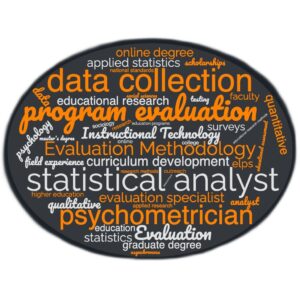Welcome to the University of Tennessee, Knoxville, Online Masters in Education – Evaluation Methodology!
Evaluation is the systematic study of an organization or program’s fidelity, merit, or worth, using a recognized set of national standards. The Evaluation Methodology concentration master’s (MS) program is designed to provide students with a broad and rigorous study of the field of evaluation.  Students will learn quantitative, qualitative, and mixed-methods evaluation designs, effective communication skills, cutting-edge reporting strategies, and hands-on application of evaluation procedures.
Students will learn quantitative, qualitative, and mixed-methods evaluation designs, effective communication skills, cutting-edge reporting strategies, and hands-on application of evaluation procedures.
Our program prepares professionals who are seeking to enhance their skills and develop new competencies in the rapidly growing field of evaluation methodology.
Students in this 30-credit hour graduate program complete core coursework in the latest evaluation principles, practice, and methodology, and engage in relevant field-based evaluation experiences, culminating in a portfolio-based comprehensive examination prior to graduation. The program is designed to be completed in two years (6 credits, 2 classes per semester), however students may take up to six years to complete their degree.
Click here to view our program brochure
Click here for Our Blog & the latest Program News
The Evaluation Methodology master’s program is designed for the working professional. It is offered fully online and asynchronous, which enables students to complete their weekly assignments at times convenient for them. While courses are asynchronous, program faculty offer optional synchronous help sessions, weekly online student hours, and are available for one-on-one meetings as students progress through the coursework. 
The Evaluation Methodology Program Coordinator will serve as the student’s main advisor, ensuring that students successfully advance through courses, assisting students with obtaining relevant professional development, guiding students through their practicum courses, and mentoring students as they finalize their final project (i.e., comprehensive exam portfolio). Each semester students will also be required to attend at least one virtual advising session (either with their cohort or individually, depending on the semester) led by the Evaluation Methodology faculty where students will receive guidance regarding courses, practical experience opportunities, program activities, career planning, and be able to ask questions relevant to their needs.
Courses in the Evaluation Methodology program are taught by experienced professionals in the field of evaluation. Our instructors work as evaluation professionals, applied researchers, and full-time evaluation faculty, many of which have won prestigious teaching awards and routinely earn positive teaching evaluations. Lastly, the program does not require standardized test scores for admittance. Instead, admission decisions are made based on the whole student, their relevant work and life experiences, previous coursework, and their passion for exploring the world of evaluation.
Leadership:

Jennifer Ann Morrow
Associate Professor
Program Coordinator, Evaluation Methodology Online
jamorrow@utk.edu
865-974-6117
Dr. Morrow is an Associate Professor in Evaluation Statistics and Methodology. For the past 22 years she has been training emerging evaluators and assessment professionals. Her main research areas are higher education evaluation and assessment, training emerging evaluation and assessment professionals, and college student development. She is active in the American Evaluation Association (Assessment in Higher Education, Teaching of Evaluation, and Research on Evaluation TIGs) and the Association for the Assessment of Learning in Higher Education (member of the Intersection and Emerging Dialogues Publication committees).
Faculty:

Austin Boyd
Adjunct Instructor
aboyd26@vols.utk.edu
Dr. Boyd is a researcher at the American Reading Company, where he does efficacy and validity research on K-12 English and Spanish reading instructional material. He is also an adjunct professor in Evaluation Statistics and Methodology for the University of Tennessee Knoxville. Dr. Boyd graduated from the ESM doctoral program in May of 2022, and was awarded the Helen B. Watson Faculty/Student Award for Outstanding Dissertation in April of 2023. His research interests include psychometric analyses, (social) network analyses, and the role parasocial relationships play in social media celebrity popularity.

Brenna Butler
Adjunct Instructor
bberry10@vols.utk.edu
Brenna Butler (BS in Psychology from Penn State University, ’17; PhD in Educational Psychology and Research – Evaluation, Statistics, and Measurement, ’21) is an Evaluation Specialist for Penn State Extension, housed within the College of Agricultural Sciences. Brenna’s primary responsibilities include designing, implementing, and analyzing the results of evaluations and assessments for educational programs and grants within Penn State Extension that deliver science-based information to Pennsylvanians. Brenna also coaches Extension faculty and staff on how to conduct a wide range of evaluation components across the evaluation lifecycle (e.g., logic models, needs assessments) to implement into their program development processes for their educational outreach programs. Brenna also has experience conducting organization-wide evaluations measuring employee engagement within Extension. Brenna’s research interests include best practices in data visualization and evaluation report writing for both technical and non-technical audiences. Brenna received the UTK Educational Psychology & Counseling (EPC) Graduate Student Teaching Excellence Award in 2019.

S. Nicole Jones
Adjunct Instructor
snicjo@utk.edu
Dr. Jones is the Assessment and Accreditation Coordinator for the DVM program in the College of Veterinary Medicine at the University of Georgia (UGA). Her degrees include a PhD in Educational Psychology: Evaluation, Statistics, and Measurement (UT-Knoxville), MEd in College Student Affairs Administration (UGA), and a BS in Psychology (UGA). Dr. Jones has worked in higher education for 15 years and most of that time was spent in academic advising and academic/career coaching before moving into STEM-related program evaluation and assessment in 2021. She also has 5 years of investigative/analytical experience supporting counter-terrorism and counter-intelligence investigations through collecting, analyzing, and disseminating primarily qualitative data. Her current research interests include competency-based assessment methods and the use of artificial intelligence in higher education assessment and evaluation. Dr. Jones is a current member of the American Evaluation Association and the Association for the Asssessment of Learning in Higher Education.

Gary Skolits
Adjunct Instructor
Gskolits@utk.edu
In my emeritus status. I seek to share my evaluation skills in service to community needs. First, I continue to mentor students and serve on ESM doctoral Committees. Second, seeking to put my evaluation competencies in action, I volunteer as an active, engaged board member and officer for Good Neighbors of Blount County – a former faith-based community organization serving community members/families encountering a major crisis, especially in the form of unanticipated emergencies leading to substantive financial, food, and housing insecurities. In this role, I have engaged in supporting direct coaching activities with incoming clients (including assessment of the immediate presenting family financial crisis, offering some level of GNBC financial support for short-term emergency assistance for utilities and rent), as well as needs assessment for further community referrals such as food banks, housing, utility resources, and job acquisition/training. I also reviewed the curriculum and supported our new free budgeting course for clients seeking longer term financial stability (Budgeting, Debt Payment Planning, and Building for the Future). I mainly engage in raising substantive funds for the organization, by helping manage and implement major fundraising activities across the year (events such as dinners, golf tournaments, direct mail solicitation, etc.). In addition, I have supported our initial successful grant effort, where we received a multi-year East Tennessee Collaborative from United Way of Blount and Knox County (part of a state program based on an experimental design in the service to ALICE (Asset Limited, Income Constrained, Employed) population of the growing local “working poor” populations. Finally, I am currently preparing a manuscript on strategic leadership and team development, especially within shared governance structures and contexts, based upon my evaluation experience as the executive director of the UT Institute for Assessment and Evaluation as well as my prior role the UTK senate president. I also volunteer for the UTK Faculty Senate – Committee on Appeals – where our team has identified gaps and misalignments in the UT faculty appeals processes and policies in light of AAUP recommended guidelines.

John Walker
Adjunct Instructor
jwalk141@utk.edu
Dr. John Walker is a graduate of the Evaluation, Statistics, and Methodology (ESM) PhD program at the University of Tennessee, Knoxville. Currently, John is a psychometrician at Renaissance Learning where his work is focused on the application of psychometric theories and machine learning processes in K-12 educational testing. His current research studies include methods to limit nonconvergence of maximum likelihood algorithms in 3PL IRT models, synthesizing machine learning and multidimensional psychometric models together to optimally and accurately measure student attainment of math and reading skills, linking and equating Renaissance Learning assessments with state-wide tests, and producing measures of validity and reliability for new and existing Renaissance Learning assessments. In addition, he serves as a part-time Lecturer in the ESM program at UTK where he has taught courses in statistics, assessment, educational research methods, and psychometrics.
Master’s in Education, Online Evaluation Methodology Concentration:
Evaluation is the systematic study of an organization or program’s fidelity, merit, or worth using a recognized set of national standards. The Distance Education Online Evaluation Methodology concentration master’s program is designed to provide students with a broad and rigorous study of the field of evaluation. Students will learn quantitative, qualitative, and mixed-methods evaluation designs, effective communication skills, cutting edge reporting strategies, and hands-on application of evaluation strategies. The program prepares professionals who are seeking to enhance their skills and develop new competencies in evaluation methodology. Students in this 30-graduate credit hour program will complete core coursework in evaluation principles and practice, methodology, and engage in field-based evaluation experiences. Prior to graduation, students must pass a portfolio-based comprehensive examination.
Program Student Handbook
Click here to view the Evaluation Methodology Masters Program’s Student Handbook
Credit Hours Required
30 graduate credit hours
Required Courses: 27 Credit Hours
- ESM 533 – Program Evaluation I
- ESM 534 – Program Evaluation II
- ESM 559 – Introduction to Qualitative Research in Education
- ESM 560 – Evaluation Designs and Data Collection Methods
- ESM 570 – Disseminating Evaluation Results
- ESM 577 – Statistics in Applied Fields I
- ESM 583 – Survey Research
- ESM 590 – Evaluation Practicum I
- ESM 591 – Evaluation Practicum II
Electives: 3 Credit Hours
- ESM 581 – Educational Assessment
- ESM 677 – Statistics in Applied Fields II
- ESM 672 – Teaching Practicum in Evaluation, Statistics, & Methodology
- ESM 682 – Educational Research Methods
- Or another distance education course approved by the program coordinator
Additional Course Requirements
- To meet program requirements, students must select courses in consultation with a program advisor. Program totals are minimums and some students may be required to complete additional coursework to overcome background deficiencies.
Non-Course Requirements
- Students will complete an online portfolio to satisfy the requirement for a project for this non-thesis Master’s. The portfolio will be evaluated by a committee and a grade of Pass is required to earn the Master’s degree.
In-state tuition: 6,278.00 per semester
Out-of-state tuition: 6,953.00 per semester
Applications are due by July 1st each year for Fall admission.
Admissions Standards/Procedures:
Admission is based on a holistic view of an applicant’s qualifications and previous educational experiences. GRE scores are optional. Prior graduate work will be examined on a case-by-case basis to determine if it can be used to satisfy some course requirements.
